Introduction
The internet, a transformative invention that has revolutionized the way we communicate, learn, and access information, has become an integral part of modern life. Its pervasive presence has brought unprecedented connectivity, convenience, and global access. However, alongside its numerous advantages, the internet also brings a host of disadvantages that impact various facets of individuals' lives and society as a whole. This article aims to provide a comprehensive examination of the downsides of the internet, exploring its potential pitfalls, negative effects on mental health, privacy concerns, impact on society, and the imperative need for responsible usage.
Impact on Mental Health
While the internet offers instant connectivity and access to a wealth of information, it is not without its detrimental effects on mental health. The rise of social media, online comparison, and the constant need for validation through likes and comments can lead to feelings of inadequacy, anxiety, and depression. The virtual world's unrealistic standards of success and body image can contribute to body dysmorphia and low self-esteem among users.
Privacy Concerns and Data Security
The vast interconnectedness of the internet has led to significant privacy concerns and data security issues. The accumulation of personal data by tech giants and online platforms raises questions about users' control over their information. Instances of data breaches, hacking, and unauthorized access to personal accounts underscore the challenges of maintaining online privacy and safeguarding sensitive information.
Spread of Misinformation and Fake News
The democratization of information on the internet has a dark side—the rapid spread of misinformation and fake news. Falsehoods and sensationalized stories can go viral, causing confusion, panic, and real-world consequences. The lack of fact-checking mechanisms and echo chambers that reinforce existing beliefs contribute to the perpetuation of inaccurate information.
Social Isolation and Diminished Face-to-Face Interaction
Paradoxically, the very tool designed to connect people globally can contribute to social isolation on an individual level. The allure of screens and online interactions can lead to diminished face-to-face interactions, eroding the depth and quality of relationships. The convenience of digital communication often results in shallow interactions that lack the nuances of in-person conversations.
Impact on Education and Learning
While the internet offers a treasure trove of information, it also presents challenges to traditional education and learning methods. The easy access to online content has led to issues of plagiarism, reduced critical thinking, and reliance on quick answers rather than deep understanding. Moreover, the prevalence of distractions and multitasking online can hinder focused learning.
Addiction and Impaired Productivity
The addictive nature of the internet, especially social media and entertainment platforms, can lead to compulsive usage and impaired productivity. Individuals find themselves spending significant amounts of time scrolling through feeds, watching videos, or playing online games, leading to time mismanagement and a decline in real-world accomplishments.
Online Bullying and Harassment
The anonymity provided by the internet can embolden individuals to engage in negative behaviors, including cyberbullying and online harassment. Victims can face hurtful comments, personal attacks, and even threats, leading to emotional distress, anxiety, and depression. The ease with which hate speech and toxicity can spread online poses significant challenges for creating safe online spaces.
Impact on Traditional Industries
The rise of the internet has disrupted traditional industries and business models. E-commerce and digital platforms have altered the retail landscape, leading to the closure of brick-and-mortar stores. The music and publishing industries have also undergone significant changes due to digital distribution, impacting revenue models and artists' livelihoods.
Digital Divide and Inequity
While the internet offers boundless information, not everyone has equal access to its benefits. The digital divide—a gap between those who have access to technology and those who don't—can exacerbate socioeconomic inequalities. Lack of access to reliable internet connections and digital devices can limit educational opportunities, economic prospects, and access to essential services.
Loss of Privacy and Surveillance
The digital footprint left by online activities can have lasting consequences. Personal information, browsing habits, and online interactions are often tracked and monitored by companies, governments, and third-party entities. This loss of privacy can infringe upon individuals' autonomy and create a sense of constant surveillance.
Conclusion
The internet's transformative impact on society cannot be denied, but its disadvantages and potential pitfalls are equally significant. From its impact on mental health and privacy concerns to the spread of misinformation, social isolation, and disruption of traditional industries, the internet presents a complex landscape of challenges. Responsible usage, digital literacy, and the cultivation of healthy online habits are imperative for harnessing the power of the internet while safeguarding individual well-being and societal values. Striking a balance between the benefits and drawbacks of the internet requires a collective effort, regulatory frameworks, and a commitment to ethical online behavior.



0 Comments